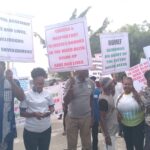I am constrained to respond to the above titled article by Chief Femi Fani-Kayode, published in the Vanguard newspaper of Sunday, November 8, 2015. Ordinarily, I don’t join issues with people, but it will be a disservice to the society to allow concocted and sensational falsehood and mischief, especially given the level of the author’s educational attainment and his position in the country.
One good thing about truth is that it always surfaces, no matter who tries to hide or suppress it. At all times, truth is complete. There is no such thing as half-truth. Therefore, in any intellectual discourse one needs to argue the pros and cons of a point. In arguing an issue, if one side is taken, the inevitable result is falsehood. This is what befell Chief Fani-Kayode’s argument as he tried unsuccessfully to put up the pros and hide the cons of the matter.
To illustrate that bloodshed in the name of a united Nigeria was carried out by northerners, particularly the so-called core North or the Hausa-Fulani, he wrote: “The truth of the Jos massacre in 1945, where hundreds were slaughtered, cannot be denied. The truth of the Kano riots in 1953, where thousands were butchered, cannot be denied. The truth of the pogroms in the North in 1966, where hundreds of thousands were killed, cannot be denied. The truth of the slaughter of millions of innocent civilians, women and children between 1967 and 1969 during the Nigerian civil war cannot be denied. The truth of the Asaba massacre in 1969, where 1,000 little boys and old men were rounded up in the town’s square and shot in the head, cannot be denied. The truth of the massacre of hundreds of thousands of Christians and ethnic minorities all over the North, particularly in the Middle Belt throughout the 1980s and 1990s, cannot be denied.
“The bitter truth of Boko Haram and the relentless slaughter of hundreds of thousands of innocent Nigerians by Islamic fundamentalists in northern Nigeria from 2009 up until today cannot be denied. The truth of the murder of dozens of young National Youth Service Corps (NYSC) members and hundreds of other people in the far North in 2011 cannot be denied. The truth of the brutal slaughter of innocent Nigerians by Fulani herdsmen over the last 20 years and up until today cannot be denied.”
Now, the truth is that all but one of these claims can definitely be denied. There was no massacre of any sort in Jos in 1945. It is the author’s invention that “hundreds were slaughtered.’’
Yes, there was the 1953 massacre in Kano, but it’s a vicious lie that “thousands were killed.” Page 21 of the official report of the Kano Disturbances of May 1953, set up by the British colonial government, gave the number of persons killed at 36 in all: 15 northerners and 21 southerners. So where did Fani-Kayode get his figures of thousands from?
Similarly, the pogrom of 1966 did not lead to the death of “hundreds of thousands.” While nothing can excuse the terrible deeds in the North and the reprisals in the East, available records put the number of casualties between 6, 000 and 8, 000, not “hundreds of thousands.’’
It is only on the Asaba massacre of 1969 that Fani-Kayode’s 1,000 casualties are near the mark. During that disturbance, 800 men and boys were killed when the federal troops entered the town after fierce fighting.
Again, the so-called massacre of Christians and ethnic minorities in the North, in terms of figures, particularly in the Middle Belt in 1980s and 1990s, is not true. The first major crisis of this nature was the Kafanchan uprising in 1987. According to the New Nigerian newspaper of April 17, 1987, the Kafanchan crisis claimed 19 lives. Then there were the Zagon-Kataf disturbances of May 1992. In sum, 471 persons were officially confirmed killed. This official figure may, however, be an understatement of the casualties and destructions as more people reportedly lost their lives.
There were several other uprisings in Adamawa, Taraba, Benue, Plateau, Kogi, Nasarawa, Bauchi, etc which, according to Wikipedia, claimed an estimated 8,211 lives. Interestingly, over 5,000 of the dead were said to be Hausa-Fulani Muslims who were viewed as unwanted settlers. It is also important to note that the majority of those killed were not Christian minorities but Hausa-Fulani Muslims.
Equally, the same Wikipedia put the total number of deaths by the Boko Haram insurgency at over 17,000. And this is understandable, given the fact that the battle zone is predominantly the Hausa-Fulani territory.
While one cannot deny the regrettable killing of innocent members of the NYSC, along with many others in the wake of the 2011 general elections, it can, however, be asserted that the issue of Fulani herdsmen is a very recent phenomenon. Even at that, the herdsmen only kill in retaliation.
Let it be known that I am not defending or justifying killings. Every life is truly sacrosanct; therefore, every act of killing must be totally condemned. But it is not proper to put the blame of various killings on one group of people. That is the impression we want to correct.
Why didn’t Fani-Kayode mention the brutal uprisings in the Western Region in the wake of the 1965 elections? Why didn’t he bring up the disastrous coup of January 1966? Why didn’t he bring up the deadly Ondo uprising in the wake of the 1983 elections? Why didn’t he bring up the vicious Oo’dua People’s Congress (OPC) brigandage in the South-West? And why didn’t he bring up the killings by the Niger Delta militants and the MASSOB, in which northerners have been victims?
It is not proper to feed the public with falsehood and unnecessary propaganda. Let the truth be completely told so that this country can move forward.
 Join Daily Trust WhatsApp Community For Quick Access To News and Happenings Around You.
Join Daily Trust WhatsApp Community For Quick Access To News and Happenings Around You.


